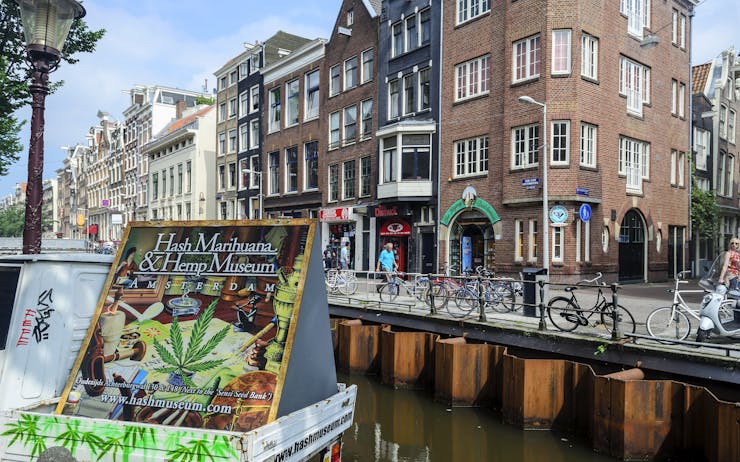Are Dutch Coffeeshops in Danger of Going Extinct?

Coffeeshops are as quintessentially Dutch as wooden shoes, bicycles, and splitting the bill, so thankfully there is resistance to increasing restrictions. In 2012, Amsterdam’s mayor, Eberhard van der Laan, fought the proposed weed pass system as he believed it would have negative effects both on tourism and crime:
“They will swarm all over the city looking for drugs … This would lead to more robberies, quarrels about fake drugs and no control of the quality of drugs on the market. Everything we have worked toward would be lost to misery.”
Nevertheless, the developed system can benefit coffeeshop owners to an extent. The guidelines do provide them with some security, and jurisprudence has been growing. Some coffeeshop owners whose businesses were closed down have successfully appealed. With each lawsuit, it’s becoming clearer what is allowed or prohibited and what the penalties are.
For the most part, authorities do not concern themselves much with the sale or use of cannabis, instead focusing on crime. Unfortunately, the current situation simultaneously creates conditions for a best case scenario of a poor quality product and, at worst, cannabis adulterated with dangerous substances. The Netherland’s policy fails to prevent illicit activity, drug tourism, and, ultimately, to make anyone safer.
The US is legalizing cannabis with initiatives to legislate for the cultivation, manufacture, distribution, and consumption of cannabis products. Making sure the best product possible gets into the hands of the right people is the key to a successful policy. It’s one Dutch activists are now working to implement in their own country before things turn too far in the other direction.
What Lessons Can the United States Learn From the Dutch Coffeehouse System?

Whether the Dutch continue with this model in the future is uncertain, but their experience is certainly informative for the United States. Dutch citizens use cannabis at more modest rates than some of their neighbors, and they don’t seem particularly likely to escalate their use relative to their counterparts in Europe and the US. There are indications that, rather than increasing “the gateway” to hard drug use, separating the soft and drug markets possibly reduced the gateway. Coffeeshops and tolerance of cannabis played an important role in pacifying the heroin epidemic, especially in keeping young people away from that sub-culture.
For cannabis advocates in the US, perhaps the most important lesson be learned from this experience is that progress is not linear.
However, the Dutch experience also raises some cautionary notes. There are several lines of circumstantial evidence that the Dutch system increased consumption, especially in its early years when coffeeshops were spreading. Many people look to the Netherlands as a model for what might happen if cannabis were legalized in the US, but what the Dutch have done is far more nuanced than what is proposed in any of the ballot initiatives in the United States.
For cannabis advocates in the US, perhaps the most important lesson be learned from this experience is that progress is not linear; very often it ebbs and flows and does not necessarily move in a straight line. The importance of the ballot initiatives this coming November in the US can’t be stressed enough.
Will Dutch-Style Coffeeshops Come to the United States?

As Washington, Colorado, and Oregon permit both the growing and distribution of marijuana, they are actually more liberal than the Netherlands. However, by banning public use, states may be missing an opportunity to promote responsible behavior while hindering cannabis-related tourism. There’s every reason to feel that cannabis lounges could have positive consequences. All three states ban on-site consumption at licensed pot stores, which are barred from selling anything other than marijuana products.
Furthermore, Colorado’s Amendment 64 says “Nothing in this section shall permit consumption that is conducted openly and publicly,” while Washington’s I-502 had banned consumption “in view of the general public.” Unfortunately, for Washingtonians who had been using private settings to circumvent regulations, a new law makes operating “a club, association, or other business, for profit or otherwise … where members or other persons may keep or consume marijuana on the premises” a Class C felony. Similarly, for those in Oregon, new rules introduced by the Oregon Health Authority which took effect at the start of 2016 have nixed any potential for lounges in the state.
Still, there can be possible ways around these restrictions, as shown by the growing number of cannabis lounges in Colorado. One of the first cannabis clubs in the country was opened by Cheryl and David Fanelli in Nederland. The Fanellis took advantage of an exception in the Colorado Clean Indoor Air Act, the same exception that covers private, members-only spaces where smoking is allowed.
Club Ned is open only to dues-paying members, who are required make appointments and must bring their own product. The club aims to create the sociable atmosphere of Dutch “coffeeshops.” That’s some mighty crafty maneuvering, but let’s not follow in the steps of the Netherlands, creating a labyrinthine set of regulations and clever short-cuts to arrive at a solution. Again, we have the opportunity to get our own system straight, all the way from the soil and hydroponics right up to the convivial coffeeshop.





